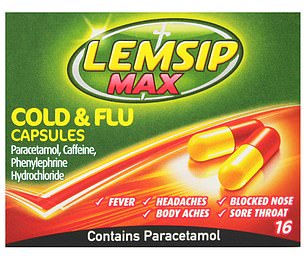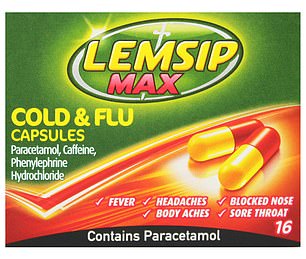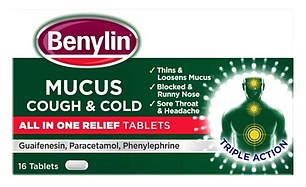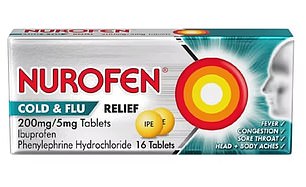Row ensues as doctors call BAN Lemsip because ‘it doesn’t work’ – but some claim it’s the ONLY thing that relieves a stuffy nose












Britons have reacted in shock after experts this week called for dozens of popular cold and flu medications, including Lemsip, to be pulled from British shelves because they don’t work.
US health officials have already proposed phasing out oral medications containing the decongestant phenylephrine over concerns they are “ineffective.”
If this is accepted, popular over-the-counter tablets and pills could be discontinued across the Atlantic.
Health experts are calling for the same to happen in Britain, arguing that British customers are being misled by the pharmaceutical companies behind the ‘useless’ drugs – including Sudafed, Lemsip and Beechams.
But social media users today expressed shock at the move, with one claiming it is one of the few drugs that actually relieves a stuffy nose.
However, others called the products “expensive scams” and accused pharmaceutical companies of “defrauding the public.”
In one post, a user said: ‘I was sad when they banned Nightnurse, the only thing I’ve ever known that keeps the cold at bay. Now Lemsip!
“Why do they keep getting involved and making things worse for everyone?”


US health officials have already suggested getting rid of oral medications containing the decongestant phenylephrine over concerns they are ‘ineffective’


Health experts are calling for the same to happen in Britain, arguing that British customers are being misled by the pharmaceutical companies
Another wrote: ‘I had a Lemsip a week ago with a stinking cold. It worked for me, so keep your hands off them.’
A third, on X, added: ‘Leave my Lemsip alone! It’s a MIRACLE DRUG.’
Still, some users claim the products are little more than a placebo in helping fight colds.
“Isn’t Lemsip just soluble paracetamol that tastes like damn?” wrote one.
‘Take these expensive scams off the shelves. The drug companies are deceiving the public!,” said another.
The concerns about phenylephrine relate only to oral formulations of the product, and not to nasal sprays which cost around £5.
Manufacturers claim that phenylephrine relieves stuffy noses by reducing the swelling of the small blood vessels in the nostrils, allowing more room for air passage.
NHS watchdog, the National Institute for Health and Care Excellence, states orally administered decongestants ‘can relieve a stuffy nose in the short term’.



But social media users today claimed it is one of the few medications that actually relieves nasal congestion. However, others labeled the products an “expensive rip-off” and accused pharmaceutical companies of “defrauding the public.”


Manufacturers claim that phenylephrine relieves stuffy noses by reducing the swelling of the small blood vessels in the nostrils, making more room for air to pass through
However, this effect “does not last more than a few days and the benefit is relatively small.”
Other reviews have found that phenylephrine only appears to work in nasal spray form, as it delivers the drug directly into the nose.
Professor Ron Eccles, who led the Common Cold Center at Cardiff University before retiring in 2017, told MailOnline today: ‘Phenylephrine should be taken off the shelves as it is an ineffective drug.
‘Consumers can treat nasal congestion with oral products containing pseudoephedrine, but this is not on the shelves and is only available by asking the pharmacist for a product.
‘My opinion is that the nasal sprays containing oxymetazoline or xylometazoline are about four times more effective than pseudoephedrine and also work within a few minutes.
“So I would always recommend taking a nasal spray instead of an oral decongestant.”
Meanwhile, Dr Leyla Hannbeck, chief executive of the Independent Pharmacies Association, told MailOnline: ‘It is time for our regulators to step in and provide their advice to help all pharmacists make the properly informed professional decision.
‘The debate over the effectiveness of phenylephrine as an oral decongestant has been going on for some time and the science now appears to prove that it is ineffective, while there are plenty of other products available for nasal congestion.’


Brands including Sudafed, Lemsip and Beechams all sell oral medicines containing phenylephrine for almost £5 in the UK
But the Medicines and Healthcare products Regulatory Agency (MHRA), which oversees the safety of medicines used in Britain, has refused to take action, saying ‘no new safety concerns have been identified’.
Instead, it has urged people to continue using ‘as directed’.
The Proprietary Association of Great Britain (PAGB), which represents companies that make over-the-counter drugs, also stressed that patients should not be concerned about the FDA’s ruling.
Michelle Riddalls, CEO, told MailOnline: ‘Consumer safety is of the utmost importance to our members, including those who manufacture products containing phenylephrine.
‘The products on the market here that contain phenylephrine are combined with other active ingredients to provide the best possible symptom relief.’
The US Food and Drug Administration’s (FDA) proposal will not do that yet have an immediate effect on the medications.
Public opinion on this issue is first sought.
Only then, if the review finds phenylephrine to be ineffective, will a final order be issued, removing it from over-the-counter medications.
The FDA’s ruling on phenylephrine does not affect another popular decongestant: pseudoephedrine.
Phenylephrine use boomed after products made with pseudoephedrine were restricted in Britain in 2008 to prevent criminals from turning it into the illegal drug crystal meth.
It is illegal to sell or supply to British people any product containing more than 720mg of pseudoephedrine without a prescription.
However, earlier this year the MHRA updated its guidelines for pseudoephedrine due to safety concerns, meaning patients with very high blood pressure or kidney disease should no longer take it.
In exceptionally rare cases, this drug can cause posterior reversible encephalopathy syndrome (PRES) or reversible cerebral vasoconstriction syndrome (RCVS), the medicines watchdog warned.




